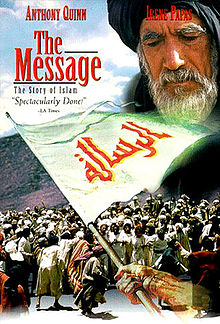- Mohammad, Messenger of God
-
The Message 
The Message promotional film posterDirected by Moustapha Akkad Produced by Moustapha Akkad Written by H.A.L. Craig
A.B. Jawdat al-Sahhar
Tawfiq al-Hakim
A.B Rahman al-Sharkawi
Mohammad Ali MaherScreenplay by H.A.L. Craig Based on The Islamic prophet Muhammad Narrated by Richard Johnson Starring Anthony Quinn
Irene Papas
Michael Ansara
Johnny Sekka
Michael ForestMusic by Maurice Jarre
Royal Philharmonic OrchestraCinematography Said Baker
Jack Hildyard
Ibrahim SalemEditing by John Bloom
Hussein AfifiStudio Filmco International Productions Inc. Distributed by Tarik Film Distributors
Anchor Bay EntertainmentRelease date(s) March 9, 1976 Running time 178 minutes Country Morroco
LibyaLanguage English
ArabicBudget $10 million Box office $5 million This article is part of the series: Islam 
Mohammad, Messenger of God (in Arabic: الرسالة Ar-Risalah; U.S. title: The Message) is a 1976 film directed by Moustapha Akkad chronicling the life and times of Muhammad, the prophet of Islam. Released in both Arabic and English, Mohammad, Messenger of God serves as an introduction to early Islamic history.
Contents
Plot
The film follows Muhammad's first years as a prophet starting with Islam's beginnings in Mecca in which the Muslims are persecuted, the exodus to Medina, and ending with the Muslims' triumphant return to Mecca. A number of crucial events, such as the Battle of Badr and Battle of Uhud are depicted, and the majority of the story is told from the point-of-view of peripheral individuals such as Hamza ibn `Abd al-Muttalib (Muhammad's uncle), Abu Sufyan (the leader of Mecca) and his wife Hind bint Utbah (enemies of Islam who later become Muslims themselves).
Production
Director Akkad faced resistance from Hollywood to making a film about the origins of Islam and had to go outside the United States to raise the production money for the film. Lack of financing nearly shut down the film as the initial backers pulled out; financing was finally provided by Libyan leader Muammar al-Gaddafi. The film was shot in Libya and Morocco, with production taking four and a half months to build the cities of Mecca and Medina as they looked in Muhammad's time.
Director Akkad saw the film as a way to bridge the gap between the Western and Islamic world, stating in a 1976 interview:
"I did the film because it is a personal thing for me. Besides its production values as a film, it has its story, its intrigue, its drama. Beside all this I think there was something personal, being Muslim myself who lived in the west I felt that it was my obligation my duty to tell the truth about Islam. It is a religion that has a 700 million following, yet it's so little known about it which surprised me. I thought I should tell the story that will bring this bridge, this gap to the west."
Akkad also filmed an Arabic version of the film (in which Muna Wassef played Hind) simultaneously with an Arab cast, for audiences in the Middle East. He felt that dubbing the English version in Arabic would not be enough, as the Arabic acting style differs significantly from that of Hollywood. The actors took turns doing the English and Arabic versions in each scene. Both the English and Arabic versions are now sold together on some DVDs.
In a film review, The New York Times reported that "when the film was scheduled to premier in the U.S., another Muslim extremist group staged a siege against the Washington D.C. chapter of the B'nai B'rith under the mistaken belief that Anthony Quinn played Mohammed in the film, threatening to blow up the building and its inhabitants unless the film's opening was cancelled. The standoff was resolved" after the deaths of a journalist and policeman, but "the film's American box office prospects never recovered from the unfortunate controversy."[1]
Depiction of Muhammad
In accordance with Muslim beliefs regarding depictions of Muhammad, he was not depicted on-screen nor was his voice heard. This rule extended to his wives, his daughters, his sons-in-law, and his caliphs (Abu Bakr as-Siddiq, Alī ibn Abī Ṭālib, Umar ibn Khattab, Uthman ibn Affan). This left Muhammad's uncle Hamza (Anthony Quinn) and his adopted son Zayd (Damien Thomas) as the central characters. During the battles of Badr and Uhud depicted in the movie, Hamza was in nominal command, even though the actual fighting was led by Muhammad.
Whenever Muhammad was present or very close by, his presence was indicated by light organ music. His words, as he spoke them, were repeated by someone else such as Hamza, Zayd and Bilal. When a scene called for him to be present, the action was filmed from his point of view. Others in the scene nodded to the unheard dialogue.
The closest the film came to a depiction of Muhammad or his immediate family was the view of Ali's sword Zulfiqar during the battle scenes, as well as a staff in the scenes at the Kaaba or in Medina.
Cast
A series of articles on

Prophet of Islam
Muhammad
Life
In Mecca · Hijra · In Medina · Conquest of Mecca · Wives · Farewell pilgrimage · Family tree ·
Career
Qur'an · Hadith ·
Early reforms under Islam · Diplomacy · Military · Persecution by Meccans · Migration to Abyssinia ·
Miracles
Isra and Mi'raj · Relics · Splitting of the moon ·
Al-Masjid al-Nabawi ·
Views by subject
Jewish · Christian · Slavery ·
Succession
Farewell sermon · Saqifah · Pen and paper · Family · Companions · History ·
Praise
Durood · Na'at · Mawlid · Haḍra · Madih nabawi ·
Ya Muhammad ·
Perspectives
Islamic · Jewish · Bible · Medieval Christian · Historicity · Criticism · Prophetic biography · Depictions · Films · Depictions in film ·English version
- Anthony Quinn as Hamza
- Irene Papas as Hind
- Michael Ansara as Abu-Sofyan
- Johnny Sekka as Bilal
- Michael Forest as Khalid
- André Morell as Abu-Talib
- Robert Brown as Utba
- Garrick Hagon as Ammar
- Rosalie Crutchley as Sumayyah
- Damien Thomas as Zayd
- Bruno Barnabe as Umayyah
- Martin Benson as Abu-Jahl
- Neville Jason as Ja`far
- John Bennett as ibn-Salool
- George Camiller as Al-Waleed
- Donald Burton as `Amr
- Nicolas Amer as Suhayl
- Earl Cameron as al-Najashi
- Ronald Chenery as Mus`ab
- Michael Godfrey as Barra
- Habib Ageli as Hudhayfah
- John Humphry as Ubayda
- Peter Madden as Toothless Man
- Ewen Solon as Yasir
- Hassan Jundi as Kisra
- Wolfe Morris as Abu-Lahab
- Abdullah Lamrani as Ikrimah
- Ronald Leigh-Hunt as Heraclius
- Elaine Ives-Cameron as Arwa
- Leonard Trolley as Silk Merchant
- Mohammad Al Gaddary as Money Lender
- Gerard Hely as Poet Sinan
Cast of the Arabic version
- Abdullah Gaith as Hamza
- Muna Wassef as Hind
- Hamdi Gaith as bu-Sofyan
- Ali Ahmed Salem as Bilal
- Mahmud Sa'eed as Khalid
- Ahmed Marey as Zayd
- Mohammed Al-Arabi as Ammar
- Hassan Jundi as bu-Jahl
- Sana Jamil as Sumayyah
Awards and nominations
The film was nominated for an Oscar in 1977 for Best Music, Original Score for the music by Maurice Jarre.[2]
Remake
In October 2008, producer Oscar Zoghbi revealed plans to "revamp the 1976 movie and give it a modern twist," according to the Internet Movie Database and the World Entertainment News Network.[3][4][5][6] He hopes to shoot the remake, tentatively titled The Messenger of Peace, in the cities of Mecca and Medina in Saudi Arabia.
In February 2009, the producer of the "The Matrix" and The Lord of the Rings film trilogy Barrie M. Osborne was attached to produce a new movie about the Prophet Muhammad. The film is to be financed by a Qatari media company and will be supervised by Sheikh Yusuf al-Qaradawi.[7]
See also
References
- ^ Mohammad: Messenger of God Review by Mark Deming of the New York Times
- ^ http://www.popculturemadness.com/Trivia/Oscars/Top-1977-O.html
- ^ "The Message Gets A Modern Remake," IMDB, 28 October 2008.
- ^ Irvine, Chris (2008-10-28). "Prophet Mohammed film The Message set for remake". The Daily Telegraph (London). http://www.telegraph.co.uk/news/newstopics/religion/3271125/Prophet-Mohammed-film-The-Message-set-for-remake.html. Retrieved 2010-05-13.
- ^ Brooks, Xan (2008-10-27). "Controversial biopic of Muhammad set for remake". The Guardian (London). http://www.guardian.co.uk/film/2008/oct/27/1. Retrieved 2010-05-13.
- ^ "Prophet Muhammad film announced". BBC News. 2008-10-28. http://news.bbc.co.uk/1/hi/entertainment/7695669.stm. Retrieved 2010-05-13.
- ^ [1]
External links
- Mohammed: Messenger of God at AllRovi
- The Message at the Internet Movie Database
- The Message at Rotten Tomatoes
Categories:- 1976 films
- Arabic-language films
- English-language films
- Religious epic films
- Films about Muhammad
- Cinema of Libya
- Films directed by Moustapha Akkad
Wikimedia Foundation. 2010.
